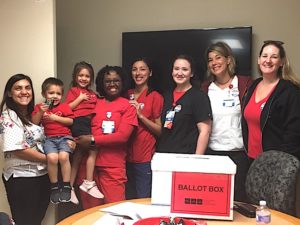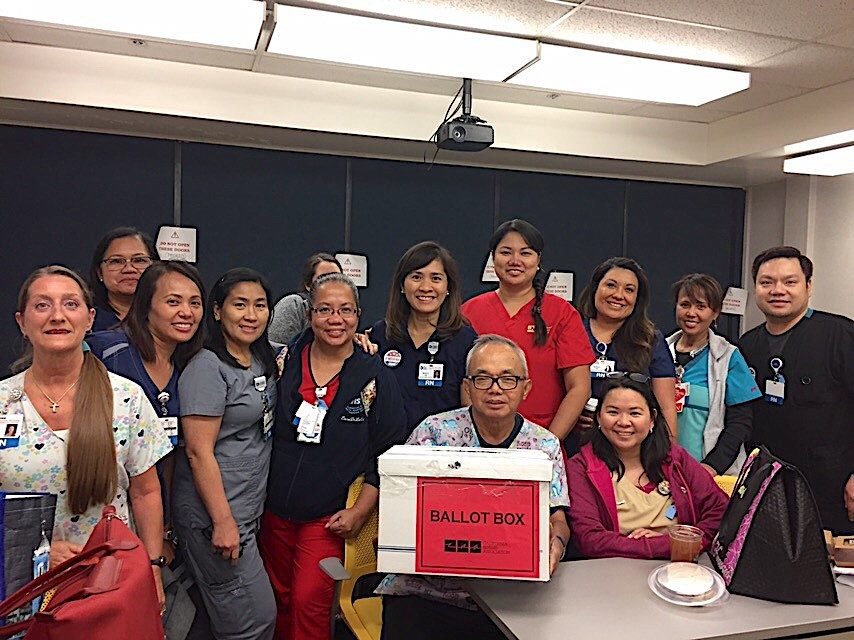PALM SPRINGS — If nurses at Desert Regional Medical Center cannot resolve contract negotiations with the hospital, which have been underway since September 2018, some 99 percent of the nurses have voted to strike when their contract expires on Sept. 5.
The hospital will receive the mandatory 10-day notice prior to any planned strike action.
The current four-year contract was negotiated in 2014. It took effect Jan. 1, 2015.
Contract negotiations continued Tuesday, Aug. 27.

The day nurses voted to strike at Desert Regional Medical Center.
“Nurses are united in advocating for a strong contract that benefits patients, the community, and the hospital,” Laura Bruce, an RN at Desert Regional Medical Center and a member of the bargaining team, told Uken Report.
Bruce said she could not discuss the progress of negotiations – or possible lack thereof.
The hospital has been notified of a possible strike.
“We are in receipt of the California Nurses Association’s 30-day termination notice, and while we are disappointed in their approach, we are continuing to negotiate in good faith in an effort to reach agreement on a new contract,” Todd Burke, communications director for Tenet Health-California, told Uken Report. “Our goal is to focus on providing the best care possible, and we believe the California Nurses Association will work with us to achieve this objective, which is in the best interest of our patients. In the event that we are unable to reach an agreement, we do have contingency plans in place so that our patients continue to receive quality care and our hospital will remain fully operational.”
About 840 nurses work at Desert Regional Medical Center, Burke said.
The foreshadowing of a potential strike occurred in May when registered nurses at Desert Regional Medical Center, among others, picketed. The purpose was to urge management to invest in nursing staff. They argued that investing in staff will improve the recruitment and retention of experienced RNs, and ensure optimal patient care.
“I’ve been an RN for 27 years and I share with my colleagues a deep commitment to providing our patients with the best care possible,” said Bruce, who works in the ICU. “We want our hospitals to excel in patient care.”
Nurses are negotiating to protect breaks during their 12-hour shifts, to protect their health insurance benefits, to be paid fair cost-of-living wage increases, to be paid fair paid time off and retirement benefits, and to be paid the industry standard for on-call wages.
According to data supplied by Tenet to the California Nurses Association, the hospitals are increasingly utilizing “on call” nurses for the OR and other units for regularly scheduled procedures and non-emergent situations, rather than using “on call,” the way it is supposed to be used, for unexpected, emergent conditions. When a nurse is “on call,” they are required to return to the hospital within 30 minutes, and this includes nurses being called in after they’ve already worked an entire shift, before they’ve had an adequate rest period. Research shows that when nurses don’t work overly long hours they are more likely to provide safe patient care.
The data provided by Tenet to the California Nurses Association shows that in 2018, nurses worked more than two full weeks of overtime from “on call” work and being called back in, including right after, or within hours of completing a full shift. Since 2016 this practice has increased 48 percent, according to the California Nurses Association.
Research studies also show that when RNs are able to take adequate rest and meal breaks they are more likely not to experience the fatigue that can lead to medical errors, and injuries to both RNs and their patients. According to information supplied by Tenet, the company paid out a total of nearly eight million dollars in penalty pay to RNs from 2016-2018 for more than 140,000 missed meal breaks in the eight California hospitals planning pickets. In 2018 nurses at these hospitals reported more than 57,000 missed breaks, a 28% increase over 2016.
When the hospital has adequate staffing it is more likely that nurses can take their meal and rest breaks so they can return to work nourished and alert, Bruce said.
If nurses fail to get a satisfactory contract, a strike could come as soon as mid-September.
Desert Regional Medical Center nurses are members of the California Nurses Association (CNA). CNA is affiliated with National Nurses United, the largest and fastest-growing union of registered nurses in the United States with 150,000 members. NNU plays a leadership role in safeguarding the health and safety of RNs and their patients and has won landmark legislation in the areas of staffing, safe patient handling, infectious disease and workplace violence prevention.
The Desert Healthcare District owns Desert Regional Medical Center. It is operated by Dallas-based Tenet Healthcare.
Image Sources
- DRMC Nurses: California Nurses Association
- Strike Vote at Desert Regional Medical Center: California Nurses Association




![Enrolling Now, Rewarding Careers Ahead [Sponsored]](https://ukenreport.com/wp-content/uploads/2024/04/COD_heroes_1-1385-2-440x264.jpg)


